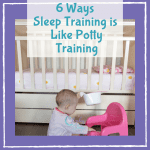
Parents of toddlers or soon-to-be toddlers — this one’s for you. We’re talking potty training today!
Whether potty training’s on your horizon or something you’re right smack in the middle of, you probably already know that the whole process is less than thrilling. For everyone. My potty training experiences have always left me wondering why human beings aren’t born knowing how to use the toilet.
We’re not discussing actual potty training techniques and methods in this article; there are plenty of other resources floating around the internet that can help you with that. Rather, we’re going to talk about potty training as it relates to our favorite topic: sleep! And, potty training and sleep training are common in some ways.
So, are potty training and sleep connected? Yes. Does one affect the other? You bet. How are they related? Keep reading.
The Two Stages of Potty Training
Many pediatric experts divide potty training into two steps, or stages: daytime training and nighttime training. The idea is that a toddler first learns to use the potty and control her bladder when she’s awake. That’s the “easier” part (although calling any part of potty training “easy” seems crazy to me!)
However, it’ll likely take your toddler longer (a lot longer, in some cases) to control his bladder when he’s asleep. A few rare toddlers complete both stages at once, achieving total dryness 24 hours a day, but they’re exceptions to the rule. Most toddlers who are potty trained during their waking hours will continue to have accidents when they’re asleep.
So take heart — all those nighttime accidents your toddler may be experiencing? They’re normal. Frustrating, but normal.
Sleep Affects Potty Training
You may find yourself wondering why, if your toddler can control his bladder when he’s awake, he can’t also control it during sleep. Our adult bodies wake us up when it’s time to go to the bathroom in the middle of the night. Why don’t our toddlers’ bodies do the same?
The answer is that they will — eventually. Remember that your toddler’s body is still growing and developing. Over time, your toddler will develop the mind-body connection he needs to wake during the night in order to go potty. For some toddlers, this happens quickly. For others (particularly for toddlers who are very deep sleepers), it may take a lot longer.
Potty Training Affects Sleep
You know by now that there are lots of elements that’ll affect your toddler’s sleep — teething, illness, sleep regressions… Just when you get into a nice “sleep groove”, it feels like another issue comes along and ruins it.
Let’s add potty training to that list. Potty training can be murder on a todder’s sleep! This is in part because it’s a huge, new skill, and just as other big skills (walking, talking, etc.) disrupt sleep, potty training will disturb your toddler’s naptime and nighttime sleep.
Potty training can also cause more toddler naptime and nighttime waking because it’s teaching your toddler a new awareness of her body. She’s learning the sensation connected with having to pee, or having to poop, and that sensation may start waking her early in the morning, or in the middle of the night. It may also cause her to wake early from her naps.
Your potty-training toddler is also becoming more and more aware of how a wet or dirty diaper (or pull-up) feels. So even if he isn’t waking in the middle of the night to actually use the potty, he may wake because his wet or dirty pull-up is making him uncomfortable (even though prior to potty training, he would’ve slept right through that sensation.)
Potty Training Will (Probably) Mean A Little Less Sleep
Just know that during the potty training process, you’re probably going to get a little less sleep than usual. So will your toddler. And that’s normal. Potty training’s a bit like sleep training in this way — during the process itself, no one’s going to sleep very well, but in the end, it’s worth it.
There are ways you can help minimize nighttime, naptime, and early-morning waking during potty training (more on that later!). But remember that at this point, you’ll want to prioritize the potty training. This is a skill you WANT your kid to have, after all! And the lack of sleep should be short-lived.
How To Make Sure Everyone Gets Enough Sleep While Potty Training
I’ve always found that term “nighttime potty training” a bit misleading. You can’t “train” a person to do anything when they’re asleep, after all. Rather, the nighttime part of potty training has to come on its own.
There are steps you can take, however, to minimize the sleeplessness that comes with potty training:
- Limit food and drinks before bed. 1.5 to 2 hours before bedtime, declare a ban on all beverages. This’ll help ensure your toddler has an empty bladder when she goes to bed.
- Encourage visits to the potty before bed. Make a potty trip part of your bedtime routine; this’ll help him empty his bladder completely.
- Consider waking your child before you go to bed. This works well for some parents — they wake their toddler around 10 or 11 p.m. (before they go to bed themselves) and make one final trip to the potty. If you have a deep sleeper, however, this won’t work at all, simply because you won’t be able to wake him up (I’m speaking from first-hand experience here!)
- Use pull-ups without shame. Sticking your potty-trained toddler in a pull-up at night can feel like failure. But remember, you can’t “teach” your toddler how to not pee or poop while she’s unconscious. Her body just needs time to catch up. So, while you’re waiting for that catch-up to happen, consider using pull-ups. It’ll keep everyone more sane.
- Try to embrace the waking. Again, prioritize the potty training. Yes, it stinks that your toddler was up twice last night, but that’s less important right now than the fact that she’s learning this important skill.
Nicole’s Note:
“One thing we see sometimes with potty training toddlers is they have a little anxiety about having an accident. They may take longer to fall asleep or wake too early in the morning. Also, some don’t grasp the concept that it is OK to get out of bed, if they have to go, so they lay there and hold it, but can’t sleep. Finally, toddlers learn VERY quickly just how happy we are they are going to the bathroom and boy do they use that to their advantage stalling bedtime by going potty 5 times! And, of course, we are so worried they will really have to go, that we take them. At some point, you do have to say ‘last time’ and make sleep the priority. Find that balance.”
A Note About Chronic Bedwetting
The majority of children are fully potty trained (day and night) by the time they start kindergarten (around 5 or 6 years old), if not before. However, a few will continue to have chronic bedwetting (also called “enuresis”). This is generally a harmless condition, but if your child has this problem, you should consult a healthcare provider, since it can be a sign of an underlying medical condition.
Potty Training Essentials
- The Complete Guide to Potty Training (Book for parents!)
- P Is for Potty (Sesame Street book for kids!)
- Diapers Are Not Forever (Board book for kids!)
- Potty Training Seat (For girls and boys!)
- Potty Training Seat (With attached step stool/ladder!)








